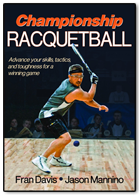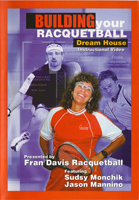 Detectives investigate a situation and gather information before they can make a determination of what happened or what they need to do to solve the mystery. A “racquetball detective” is no different. You, the racquetball detective, must analyze your opponent’s strengths and weaknesses as well as your own strengths and weaknesses, which will determine the game plan you need to put together in order to beat your opponent. Here’s a simple formula:
Detectives investigate a situation and gather information before they can make a determination of what happened or what they need to do to solve the mystery. A “racquetball detective” is no different. You, the racquetball detective, must analyze your opponent’s strengths and weaknesses as well as your own strengths and weaknesses, which will determine the game plan you need to put together in order to beat your opponent. Here’s a simple formula:
Game plan = opponent’s strengths and weaknesses + your strengths and weaknesses
There are several ways to collect the information you need in order to develop a game plan:
1. Video analysis—If you have time, this is the ideal way to watch your opponent in a match because you can watch the video leisurely as many times as you like to obtain as much information as possible that you might miss with the naked eye.
2. Scout opponent—If you are going to play the winner of a match in an hour or so and there is no time for filming and video analysis, then you could spend time watching and observing your opponent warming up and playing in a live game situation.
3. Talking to someone who has played your opponent before—This is another method you can use to help you get data on your opponent.
The more information you collect, the better prepared you will be when developing the game plan.
Use the techniques in my book “Championship Racquetball”, Chapter 7 Developing Game Plans and Match Strategy, P. 190, for more details.I advocate how to “be a racquetball detective”, even to my “Championship Team,” Paola, Rocky, Taylor, Sharon, Connor, Jordan, Spencer, Lexi and Brian. Let’s examine what tools Rocky, Paola, Jason and all of my athletes use to be in a racquetball detective by taking a closer look at all 3 sides of The Sports Racquetball Triangle: Conditioning, Mental, and Physical Skills
Left Side of the Triangle
Conditioning – core strength
Core strength is the popular term for abdominal and back strength. Each abdominal muscle has an attachment to the spine, so as you break down and train your different abdominal muscles, you are creating thicker, denser, and stronger spinal attachment muscles as well. Your core consists of upper, lower, center, and oblique muscles, so your core workouts have to incorporate all of these muscle groups. Your upper body and lower body are held together by your abdominal (core) muscles. When you pivot, turn, sprint, and hit the ball, you are using your core strength. Everything revolves around an athlete’s core strength—quickness, agility, timing, and power.
Rocky’s & Jason’s core strength is key to their performance and enhances their quickness, agility, timing and power: Racquetball is a game that involves a lot of explosive power, quickness, and ability to maneuver around on the court, therefore they are religious about having it as part of their conditioning.
Use the techniques in my book “Championship Racquetball”, Chapter 10, P.246, to learn about core strength and strength in general.
Nutrition – hydration
Your brain, muscles and all neural-electrical connections need enough body water and fluids in order to perform at their best. Your brain floats in water and your muscles work in a water base so give them the fluid they need by drinking at least 60 – 100 ounces of water each day. The day before and of a match, up the intake to all day and add a Gatorade or electrolyte drink 60 minutes into your actual match since speed and timing all rely on electrolytes. After your match, hydrate in preparation for the next one.
The more an athlete is willing to prepare properly, the more that athlete will walk onto the court with total self-confidence, consistency, focus, and concentration.
Rocky’s and Jason’s drinking routines: They both drink no less than two 2 liter bottles of water throughout the day during heavy training days as well as during tournaments.
Right Side of the Triangle
Mental Skills
Do not be oblivious to what is going on…pay attention, be aware, check for patterns and slow the game down so you can think more clearly. Use the 10 Second Rule and your Time Outs efficiently and effectively so you can gather up information about your opponent’s strengths and weaknesses and be the detective you have always wanted to be. There’s an old saying, “If you snooze you lose”.
Jason was the master at being a racquetball detective:
He kept a yellow pad of paper with him while watching EVERY match as he took notes on EVERY player’s strengths, weaknesses and tendencies. All the players were curious what he was doing and when they found out they asked if they could buy it. Jason looked at them as if to say, “What-are you kidding me?”
More details on Being a Racquetball Detective can be found in my book, “Championship Racquetball”, Chapter 9, P. 232.
Base of the Triangle
Physical Skills
Be a racquetball detective and gather AS MUCH information about your opponent as possible, but ALSO about yourself as well. With this information you can set up your drilling sessions to zero in on your weaknesses and make them your strengths.
Paola’s drilling sessions are like no other:
“I drill, practice or play three days per week late in the afternoon after I head home from school and grab a bite to eat. I make sure if it is a playing/sparring day I have my workout partner picked and ready to go once I get there and warm up thoroughly. If it is a drill day I have everything written down so when I get there, I warm up and I am then ready to get the maximum time on the court practicing my particular shots with no wasted time.”
There are various ways to drill, practice and play to improve your game in my book, “Championship Racquetball”, Chapter 8.
ALL of my players from the professionals I coach, led by Rocky and Paola, to the amateurs I coach know the value of “being a racquetball detective”. They know the IMPORTANCE of gathering the facts to develop a game plan to use against their opponent as well as to develop a game plan to us for themselves in their own drill sessions.
Next issue I will continue to build your Championship Racquetball Game one level at a time so you too can be ready to become the champion you always dreamed of, but now you will have the tools to do it and make it a reality. Rocky ‘s and all my athletes “Championship Racquetball Games” stem from their focus on ALL 3 sides of the triangle working together so they can develop into top competitors. Without a shadow of a doubt, they KNOW just how important it is to do the work. They are living proof it works and their titles substantiate it.
For details on more personalized instruction, a weekend camp, instructional DVD’s, our book, Championship Racquetball, and our APP (coming soon), ALL which covers all aspects of the Sports Racquetball Triangle and more, please visit www.FranDavisRacquetball.com. Fran Davis is a 2004 racquetball Hall of Fame inductee, Racquetball Woman of the Year 2009, Coach #2 IRT Pro Player, Rocky Carson; Coach #1 Women’s LPRT Pro Player, Paola Longoria; Coach Jr. World & National Champion, Intercollegiate Champion, & IRT Pro Player, Taylor Knoth; Coach Intercollegiate Champion & LPRT Pro Player, Sharon Jackson; Master Professional Instructor/Coach USAR-IP. International Racquetball Tour.










